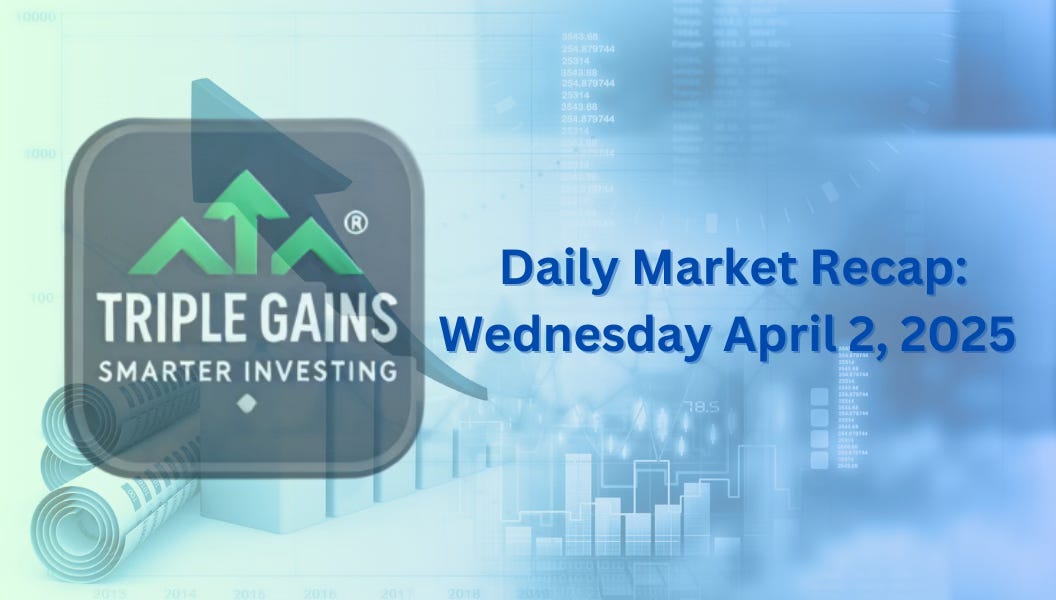Market Recap – Wednesday, April 2, 2025
US Equities Close Higher Amid Tariff Speculation and ADP Payrolls Data
US equities closed higher with the Dow up 0.56%, the S&P 500 gaining 0.67%, the Nasdaq advancing 0.87%, and the Russell 2000 rising 1.65%. Retail and apparel stocks were some of the biggest gainers as investors were optimistic about less stringent tariffs, while investment banks, asset managers, credit card companies, and airlines also saw solid gains. Big tech stocks mostly added to Tuesday’s bounce, with Tesla (TSLA) and Amazon (AMZN) seeing positive movement. On the downside, managed care, integrated energy, food, tobacco, telecom, and Chinese tech stocks lagged.
Macroeconomic Data
The March ADP private payrolls report came in stronger than expected, with 155,000 jobs added, well above the 122,000 consensus estimate. Wage growth showed signs of moderation, with job-stayers seeing a 4.6% increase and job-changers experiencing a 6.5% rise. Manufacturing saw stronger-than-average growth, but construction activity slowed. This report precedes Friday’s March Nonfarm Payrolls (NFP) data, where economists expect 125,000 jobs to have been added, slightly down from February’s 151,000 increase. The ADP data and February factory orders provided a positive signal heading into the end of the week, but broader concerns around macroeconomic conditions persist.
Tariff Speculation
The trading session was largely influenced by anticipation surrounding President Trump’s tariff announcement, expected after the bell. While details were scarce, Sky News suggested the tariffs could come in three separate bands (10%, 15%, 20%) based on country and industry. This approach was seen as more favorable than a blanket 20% tariff, which had previously been a major concern for markets. Nonetheless, worries lingered about the spillover effects of Trump’s policy uncertainty, with some market participants opting to "sell the rip" rather than "buy the rip," reflecting caution ahead of further clarity on tariffs.
Corporate News
In corporate news, Tesla (TSLA) delivered 337,000 vehicles in Q1, missing the consensus estimate of 378,000, which led to early weakness in the stock. However, TSLA rebounded after Politico reported that CEO Elon Musk would be stepping back from his advisory role in Washington. Amazon (AMZN) also saw a 2% gain following reports that it made a bid for TikTok’s U.S. operations, although this offer was not expected to be taken seriously by the parties involved. Other notable movers included Petco (WOOF), which surged 12.8% after its CEO disclosed the purchase of 1.6 million shares, and Rocket Cos. (RKT), which rose 10% following an upgrade from Deutsche Bank.
Notable Gainers and Decliners
Among notable gainers, Petco (WOOF) saw a significant 12.8% increase, boosted by CEO stock purchases signaling confidence in the company. Rocket Companies (RKT) rose 10% following Deutsche Bank’s upgrade, and Tesla (TSLA) gained 5.3% after positive news on Elon Musk stepping back from his political role. On the other hand, Edgewise Therapeutics (EWTX) was a notable decliner, falling 22.9% after disappointing trial data for its EDG-7500 drug, which showed serious adverse events in patients. Rivian (RIVN) also dropped 6% despite reporting production slightly ahead of estimates.
Here’s Our Take
The market’s upward move today was largely driven by optimism surrounding less stringent tariffs and stronger-than-expected ADP payrolls data. However, caution remains as uncertainty surrounding President Trump’s tariff policy continues to weigh on investor sentiment. As we move toward the end of the week, the upcoming March Nonfarm Payrolls report and further developments on the tariff situation will likely continue to be key drivers of market sentiment.
Investors should keep a close eye on the potential impacts of tariffs on key sectors, particularly those that are sensitive to global supply chains and import prices. Given the uncertainty, a more cautious approach may be warranted in the short term, with a focus on companies that can weather macroeconomic volatility and sector-specific risks.



